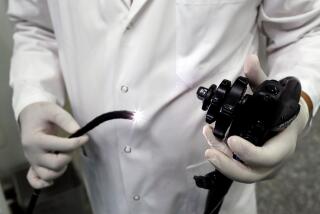Parkinson’s disease may be diagnosed by studying colon, reports say
Parkinson’s disease is a disorder of the brain, but it may be possible to diagnose it at an early stage by examining the bowel, researchers said Tuesday. As new drugs to treatParkinson’s are developed, they noted, earlier diagnosis should make it possible to intervene at an earlier stage when the disorder is more susceptible to drugs, thereby prolonging quality of life and lifespan.
Parkinson’sis a common neurological disorder that is associated with aging. It is characterized by tremors or shaking, and difficulties with walking, movement and coordination. There is no cure, and it ultimately proves fatal. An estimated 0.4% of people in industrialized countries have it, with the proportion rising above 1% in people over 60 and 4% in those over age 80. The disorder affects almost 5 million people worldwide, a number that is expected to double by 2030.
The disorder is characterized by the accumulation of a protein called alpha-synuclein in brain cells, killing the cells. The definitive diagnosis is provided at autopsy, when the brain can be examined to search for the protein. In living patients, however, the disease is diagnosed by the appearance of symptoms, and some estimates are that as many as 20% of patients may be misdiagnosed.
Dr. Kathleen M. Shannon, a neurologist at Rush Medical College in Chicago, and her colleagues reasoned that the extensive network of nerve cells in the intestines might also be affected by the disorder, especially since symptoms such as constipation frequently occur before movement disorders. In two papers published Tuesday in the journal Movement Disorders, they confirmed their suspicions.
In the first study, 10 subjects with early Parkinson’s disease who had not yet begun drug treatment underwent flexible sigmoidoscopy, in which a flexible scope is inserted into the lower bowel. The scope only goes about 8 inches in and preparation with a laxative is not required. The procedure takes five to 10 minutes. They observed abnormal levels of alpha-synuclein in biopsied tissues from all 10 patients, but not in samples from 23 healthy subjects and 23 patients with irritable bowel syndrome.
In the second study, they examined biopsy samples from three Parkinson’s patients who had undergone a colonoscopy two to five years before the diagnosis of Parkinson’s. All three showed the characteristic levels of alpha-synuclein.
“We believe that alpha-synuclein in the colonic submucosa may be a pre-motor biomarker that easily can be studied in cohorts at increased risk of developing Parkinson’s disease (relatives of Parkinson’s disease subjects, subjects with anosmia [inability to smell], rapid eye movement disorders and others),” they wrote.
But they cautioned that their results will have to be confirmed in larger numbers of patients and in those with other, Parkinson’s-like disorders.
LATimesScience@gmail.com
Twitter/@LATMaugh






